A valuation of USD 1,410.5 million has been recorded for the biomimetic collagen synthesis market in 2025, and this figure is projected to advance to USD 4,753.1 million by 2035. The growth equals an incremental addition of over USD 3,342.6 million across the decade, representing a CAGR of 12.9%.
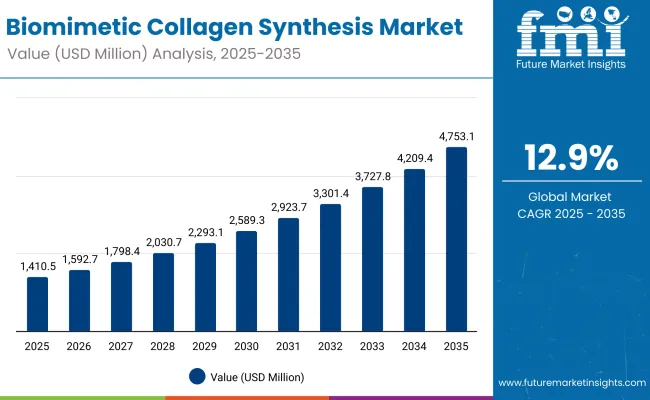
Biomimetic Collagen Synthesis Market Key Takeaways
| Metric | Value |
|---|---|
| Biomimetic Collagen Synthesis Market Estimated Value In (2025e) | USD 1,410.5 Million |
| Biomimetic Collagen Synthesis Market Forecast Value In (2035f) | USD 4,753.1 Million |
| Forecast CAGR (2025 to 2035) | 12.90% |
During the first half of the forecast period from 2025 to 2030, the market is anticipated to expand steadily from USD 1,410.5 million to USD 2,589.3 million. This stage is expected to contribute USD 1,178.8 million, which accounts for nearly 35% of the overall decade growth. The progress during this timeframe is likely to be underpinned by rising demand for advanced wrinkle repair formulations and heightened adoption of clinical-grade biomimetic actives.
Between 2030 and 2035, accelerated momentum is expected as the market grows from USD 2,589.3 million to USD 4,753.1 million. This second phase represents USD 2,163.8 million of value creation, equating to almost two-thirds of total decade expansion. Stronger uptake in high-growth regions such as China and India, alongside biotech-driven collagen boosting pathways, is expected to support this surge.
The wrinkle repair segment is projected to dominate throughout the period, while biotech-engineered proteins are anticipated to capture the largest share among ingredient types in 2025 with 56.6%, reinforcing their role as the primary growth driver for the industry outlook.
From 2020 to 2024, the biomimetic collagen synthesis market expanded steadily, reflecting early adoption of biotech-engineered proteins and peptide-based mimetics. During this phase, multinational chemical and life sciences leaders consolidated their positions, contributing to structured growth and reinforcing clinical validation standards. Competitive differentiation was driven by sustainability frameworks, research depth, and dermatologist partnerships, while consumer-facing companies increasingly sought efficacy-backed formulations.
The market is projected to reach USD 1,410.5 million in 2025, setting the stage for accelerated expansion led by Asia-Pacific, where China and India are advancing at double-digit growth rates. Between 2025 and 2035, the revenue mix is expected to tilt strongly toward clinical-grade offerings and serums, supported by digital retail platforms and precision dermatology services. Competitive strategies are forecast to shift away from volume supply toward integrated ecosystems combining biotech innovation, clinical trials, and sustainability alignment. Emerging entrants specializing in enzyme-stimulated pathways, clean-label proteins, and vegan formulations are anticipated to gain share. Long-term advantage is expected to be defined by intellectual property strength, regulatory trust, and alignment with evolving consumer values.
Growth in the biomimetic collagen synthesis market is being fueled by rising consumer demand for advanced anti-aging and skin-repair solutions. Significant progress in biotechnology has enabled proteins and peptides to be engineered with higher efficacy, which has strengthened the appeal of wrinkle repair and collagen boosting formulations. Clinical-grade claims have been positioned as a key trust driver, encouraging wider adoption across both developed and emerging economies.
Increased emphasis on preventive skincare and dermal longevity has further elevated demand, particularly among younger demographics seeking early intervention. Digital platforms and e-commerce channels have been leveraged to accelerate accessibility, while dermatology clinics and pharmacies have been utilized to build credibility. Regional expansion is being driven by rapid adoption in Asia, with China and India forecast to deliver the fastest growth trajectories. Continued investment in sustainable bio-based pathways and regulatory support for innovative collagen technologies are expected to provide strong momentum for future expansion.
The biomimetic collagen synthesis market has been structured across multiple dimensions to capture the evolving dynamics of consumer demand and scientific innovation. Segmentation reflects how functions, claims, and product formats are shaping adoption patterns. Functional categorization underscores the dermal benefits prioritized by different consumer groups, while claim-based segmentation highlights the importance of credibility and clinical validation in driving purchase behavior.
Product type segmentation further reveals the formats that are gaining prominence in both professional dermatology settings and consumer skincare routines. Each of these categories is expected to advance in line with biotechnological progress, heightened emphasis on evidence-backed formulations, and regulatory frameworks supporting safe, sustainable innovation. Together, these segments provide a comprehensive understanding of how market value will be distributed and which areas are poised to define growth trajectories through 2035.
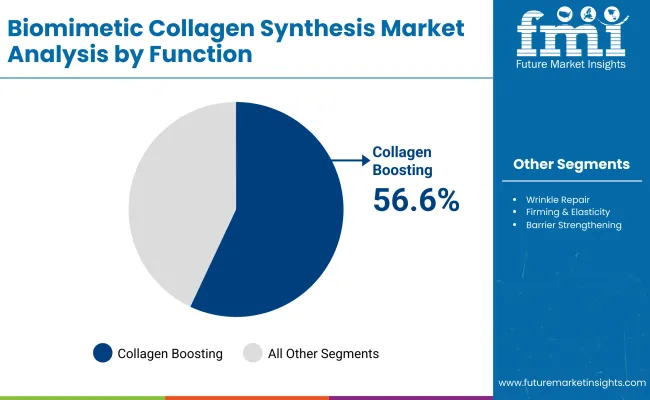
| Segment | Market Value Share, 2025 |
|---|---|
| Collagen boosting | 56.6% |
| Others | 43.4% |
The function segment is anticipated to be driven by collagen boosting, which is expected to contribute 56.6% of the total market value in 2025, equivalent to USD 791.9 million. Rising demand for preventive skincare solutions and scientifically validated dermal repair products is positioning this category as the largest growth contributor. Wrinkle repair and elasticity enhancement are being recognized as critical needs across demographics, with collagen boosting technologies at the center of innovation. Greater integration of biotech-engineered proteins and sustainable active ingredients is forecast to provide further momentum. With consumer preferences shifting toward long-term dermal health, collagen boosting is expected to remain the dominant function through the forecast horizon.
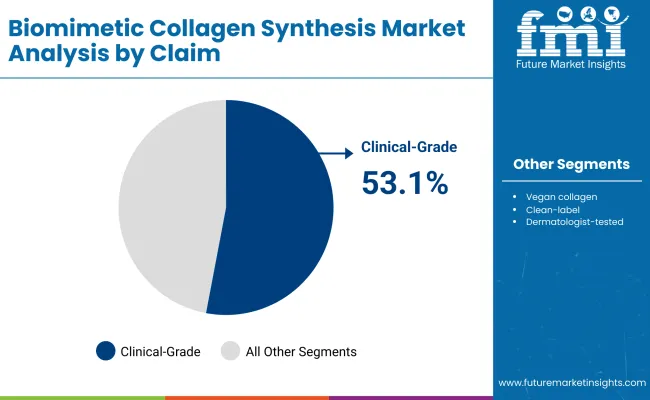
| Segment | Market Value Share, 2025 |
|---|---|
| Clinical-grade | 53.1% |
| Others | 46.9% |
The claim segment is projected to be led by clinical-grade offerings, which are expected to represent 53.1% of global value in 2025, equating to USD 735.4 million. This dominance is being supported by consumer trust in dermatologist-tested, efficacy-backed formulations that ensure visible results. Increasing emphasis on scientific validation in marketing claims is reinforcing adoption in both mature and emerging markets. As skincare buyers prioritize safety and evidence-driven performance, clinical-grade products are forecast to consolidate their leadership. Ongoing R&D and partnerships with dermatological institutions are expected to further elevate this segment’s reputation. With credibility emerging as the key driver in premium skincare, clinical-grade claims are anticipated to maintain their leading share throughout the decade.
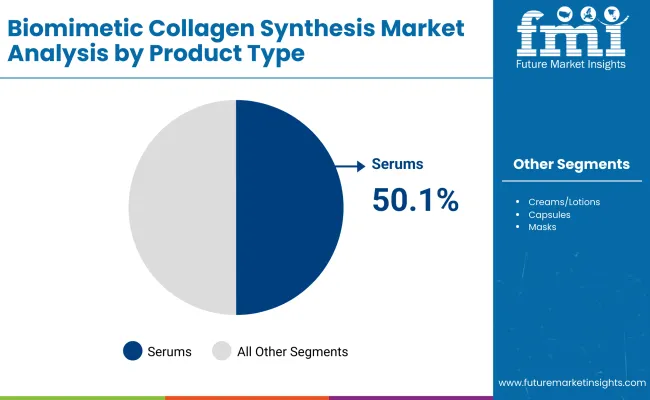
| Segment | Market Value Share, 2025 |
|---|---|
| Serums | 50.1% |
| Others | 49.9% |
The product type segment is expected to be led by serums, which are anticipated to capture 50.1% share in 2025, valued at USD 707.1 million. The dominance of serums is being driven by their concentrated formulations and rapid absorption benefits, which align with consumer preferences for high-efficacy skincare. Their suitability for layering within multi-step routines has reinforced adoption across all age groups. Innovation in delivery mechanisms and peptide-based biomimetic actives is expected to expand their appeal further. As consumer awareness of targeted skincare continues to increase, serums are forecast to retain their leadership position. Growth is anticipated to be accelerated by premium positioning, clinical validation, and alignment with evolving clean-label and sustainable product trends.
Complex regulatory pathways and high R&D expenditure are shaping the biomimetic collagen synthesis market, while biotechnology innovations, clinical validation requirements, and sustainability imperatives are influencing adoption patterns, creating both opportunities and challenges for stakeholders across advanced skincare and dermatology domains.
Integration of Bioinformatics and AI in Collagen Pathway Design
A significant driver for the biomimetic collagen synthesis market is the application of bioinformatics and artificial intelligence in molecular design and protein engineering. Predictive algorithms are being employed to simulate collagen biosynthesis pathways, enabling identification of optimized peptide structures with greater speed and precision. These technologies are expected to lower experimental inefficiencies and shorten development cycles, while ensuring higher reproducibility of results. By combining computational biology with laboratory-scale innovation, scalability of novel biomimetic actives can be achieved more effectively. This integration is likely to provide a competitive edge to industry participants, particularly in regions where clinical validation and regulatory scrutiny are stringent, such as Europe and North America.
Sustainability-Driven Shifts Toward Biotech-Engineered Alternatives
A key trend influencing the market is the transition from animal-derived collagen sources toward sustainable biotech-engineered alternatives. Consumer scrutiny of sourcing transparency and environmental impact is intensifying, leading to a greater preference for proteins developed through fermentation or plant-cell culture technologies. This trend aligns with clean-label and vegan positioning, ensuring resonance with ethically conscious buyers.
Regulatory encouragement of greener biotechnology solutions is further reinforcing this shift, pushing manufacturers to prioritize renewable production platforms. By aligning innovation pipelines with sustainability objectives, companies are expected to differentiate themselves in highly competitive premium skincare categories. Over time, sustainability-driven collagen synthesis is forecast to become an industry benchmark rather than a niche offering.
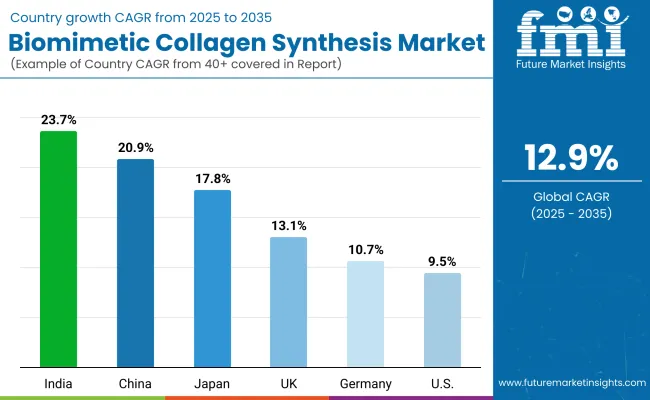
| Countries | CAGR |
|---|---|
| China | 20.9% |
| USA | 9.5% |
| India | 23.7% |
| UK | 13.1% |
| Germany | 10.7% |
| Japan | 17.8% |
The global biomimetic collagen synthesis market displays clear disparities in country-level growth trajectories, influenced by biotechnology maturity, regulatory frameworks, and evolving consumer expectations in advanced skincare. India is projected to achieve the fastest expansion, with a CAGR of 23.7% between 2025 and 2035, supported by rising adoption of preventive skincare among younger demographics and an accelerating biotech innovation ecosystem.
China is expected to follow closely with a CAGR of 20.9%, as government-backed initiatives to promote sustainable biotech and consumer appetite for clinical-grade anti-aging solutions reinforce market expansion. Japan is forecast to progress at a CAGR of 17.8%, reflecting the country’s strong emphasis on science-led beauty innovations and long-standing cultural demand for dermal longevity solutions.
In Europe, steady growth is projected, led by the UK at 13.1% CAGR and Germany at 10.7%. Both countries are likely to benefit from stringent quality standards and advanced dermatology practices that prioritize clinically validated biomimetic actives. The USA, by contrast, is expected to expand more moderately at 9.5%, with adoption shaped by mature dermatology markets and greater emphasis on premium, evidence-driven formulations. Overall, high-growth momentum is anticipated to remain centered in Asia, while Europe and North America sustain expansion through regulatory compliance and premium positioning.
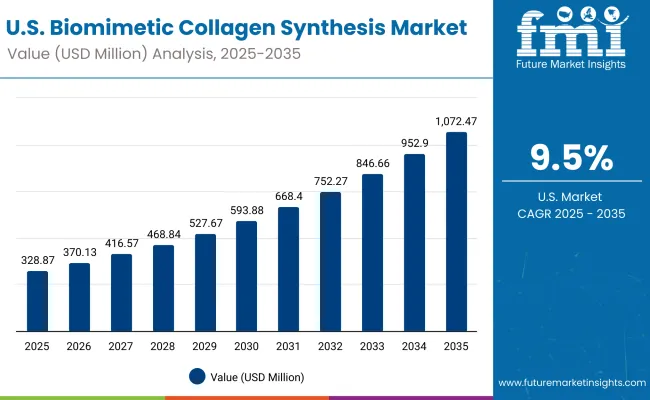
| Year | USA Biomimetic Collagen Synthesis Market (USD Million) |
|---|---|
| 2025 | 328.87 |
| 2026 | 370.13 |
| 2027 | 416.57 |
| 2028 | 468.84 |
| 2029 | 527.67 |
| 2030 | 593.88 |
| 2031 | 668.40 |
| 2032 | 752.27 |
| 2033 | 846.66 |
| 2034 | 952.90 |
| 2035 | 1,072.47 |
The biomimetic collagen synthesis market in the United States is forecast to expand at a CAGR of 9.5% between 2025 and 2035. Market size is projected to grow from USD 328.87 million in 2025 to USD 1,072.47 million by 2035, reflecting steady adoption of advanced collagen pathways. Expansion is expected to be reinforced by consumer trust in clinical-grade formulations and a strong dermatology infrastructure that prioritizes evidence-backed solutions. Premium positioning, e-commerce accessibility, and partnerships with dermatology clinics are likely to accelerate the adoption of biomimetic actives.
The biomimetic collagen synthesis market in the UK is forecast to expand at a CAGR of 13.1% between 2025 and 2035. Market development is expected to be underpinned by a stringent evidence threshold in dermatology, where clinician-endorsed, clinical-grade claims are prioritized in procurement and retail ranging. Growth is likely to be supported by strong private dermatology networks, robust pharmacy chains, and e-commerce marketplaces that reward transparency in ingredient provenance and efficacy dossiers. Premium pricing power is expected to hold, as consumers exhibit high receptivity to biotech-engineered proteins with sustainability credentials and traceable manufacturing. Regulatory expectations around green claims and data substantiation are anticipated to elevate barriers to entry, favoring IP-backed actives and partnerships with academic centers.
The biomimetic collagen synthesis market in India is projected to grow at a CAGR of 23.7% from 2025 to 2035. Expansion is expected to be propelled by rapid modernization of beauty-dermatology services, where protocolized anti-aging regimens increasingly incorporate biomimetic actives. Tier-2 and tier-3 city penetration is anticipated to accelerate through tele-dermatology and D2C platforms, while domestic biotech manufacturing is likely to enhance affordability and supply continuity. Regulatory streamlining around cosmeceutical claims is expected to reward standardized testing and post-market surveillance, improving consumer confidence. With a youthful population attentive to long-horizon skin health, multi-step routines are likely to anchor recurring purchases of serums featuring engineered peptides.
The biomimetic collagen synthesis market in China is anticipated to advance at a CAGR of 20.9% over 2025-2035. Growth is expected to be framed by a policy environment supportive of biotech self-reliance, accelerating investment in fermentation, precision peptide design, and compliant manufacturing. Cross-border channels are forecast to coexist with locally produced, CFDA-registered clinical-grade products, with performance claims scrutinized through increasingly rigorous testing norms. Consumer sophistication in anti-aging and barrier-repair categories is expected to translate into premium trade-up, particularly within serums and targeted boosters. Data-rich e-commerce ecosystems are likely to enable fast iteration of claims, pack sizes, and regimen bundles, compressing product cycle times.
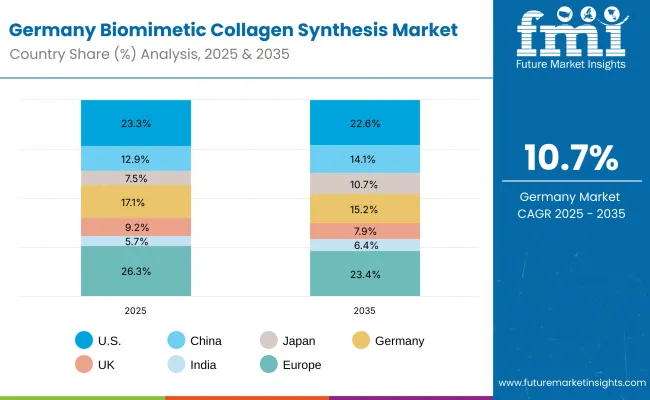
| Countries | 2025 Share (%) |
|---|---|
| USA | 23.3% |
| China | 12.9% |
| Japan | 7.5% |
| Germany | 17.1% |
| UK | 9.2% |
| India | 5.7% |
| Countries | 2035 Share (%) |
|---|---|
| USA | 22.6% |
| China | 14.1% |
| Japan | 10.7% |
| Germany | 15.2% |
| UK | 7.9% |
| India | 6.4% |
The biomimetic collagen synthesis market in Germany is expected to post a CAGR of 10.7% through 2035. Market progress is likely to be anchored in pharmacy-led distribution and dermatologist stewardship, where documented efficacy and safety profiles are treated as non-negotiable. Procurement practices are anticipated to favor suppliers offering GMP-grade production, lifecycle carbon accounting, and comprehensive technical dossiers. As reimbursement-adjacent preventive care gains traction, clinic-dispensed regimens featuring biomimetic peptides are expected to complement OTC maintenance. Engineering-driven consumers are likely to reward measurable outcomes, supporting devices and diagnostics that pair with high-potency serums.
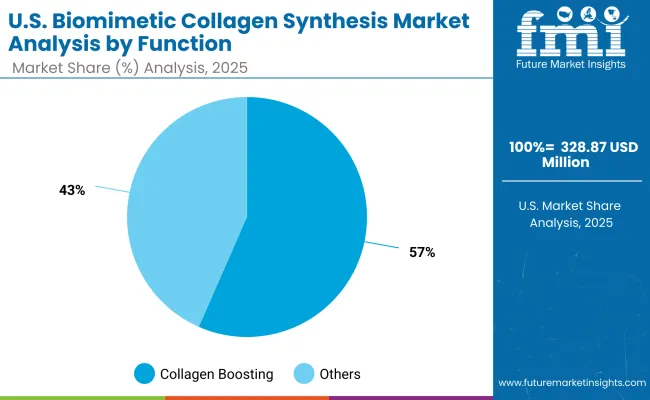
| Segment | Market Value Share, 2025 |
|---|---|
| Collagen boosting | 56.6% |
| Others | 43.4% |
The biomimetic collagen synthesis market in the United States is projected at USD 328.87 million in 2025. Collagen boosting contributes 56.6% (USD 186.0 million), while other functions account for 43.4% (USD 142.84 million). This functional dominance highlights a clear preference for formulations designed to stimulate dermal regeneration and prevent age-related structural decline. The prioritization of collagen boosting reflects the country’s advanced dermatology ecosystem, where evidence-based interventions are being widely adopted to meet rising demand for clinically validated outcomes.
Unlike general-purpose products, collagen-boosting actives are being positioned as high-value innovations with both preventive and corrective benefits. Greater penetration in clinical-grade regimens and integration into dermatology protocols are expected to further reinforce the segment’s leadership. As awareness of skin longevity accelerates, collagen boosting is forecast to remain the anchor of the USA functional landscape.
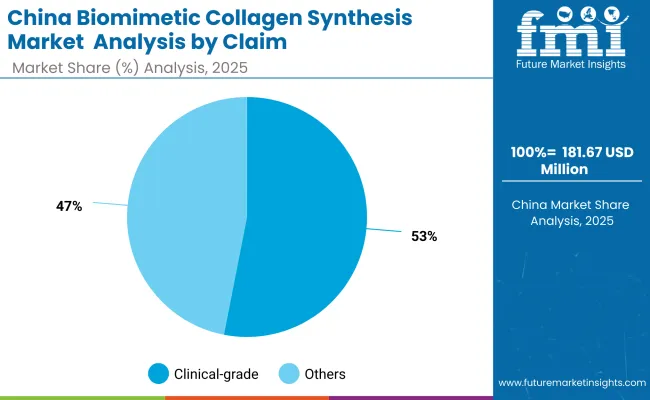
| Segment | Market Value Share, 2025 |
|---|---|
| Clinical-grade | 53.1% |
| Others | 46.9% |
The biomimetic collagen synthesis market in China is projected at USD 181.67 million in 2025. Clinical-grade offerings contribute 53.1% (USD 96.4 million), while other claims represent 46.9% (USD 85.27 million). The clear leadership of clinical-grade formulations reflects the increasing prioritization of scientific validation and regulatory compliance in China’s fast-expanding skincare sector. This positioning is expected to be strengthened by growing consumer trust in efficacy-backed solutions that align with both dermatologist recommendations and national quality standards. Unlike general claims, clinical-grade products are being recognized as premium-tier interventions with high adoption among middle- and upper-income demographics. With government initiatives encouraging biotech self-reliance and stricter oversight of product claims, clinical-grade biomimetic actives are forecast to consolidate their dominance. The shift toward credibility-driven skincare is likely to anchor China’s rapid CAGR of 20.9% through 2035.
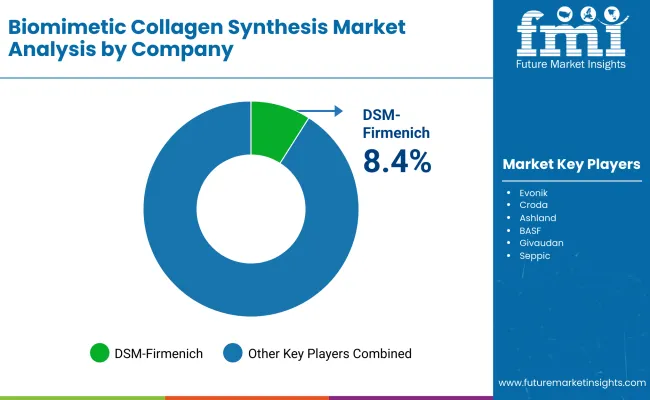
The biomimetic collagen synthesis market is moderately fragmented, with global leaders, mid-sized innovators, and specialized formulators competing across advanced skincare and cosmeceutical applications. Global leaders such as DSM-Firmenich, BASF, and Evonik hold measurable shares, anchored by deep expertise in biotechnology, fermentation, and protein engineering. DSM-Firmenich dominates the market with a global value share of 8.4% in 2025 (estimated slightly above 8% in 2024), reflecting its early investments in sustainable biomimetic actives and its strong partnerships across dermatology and clinical-grade skincare brands.
Mid-sized innovators, including Croda, Ashland, and Givaudan, are positioned around peptide-based collagen boosters, natural mimetics, and clinical formulation support. Their focus is directed toward combining biotech-engineered pathways with consumer-driven positioning such as clean-label and vegan claims. These companies are expected to accelerate adoption through product diversification and alignment with dermatology-backed claims.
Specialist firms such as Seppic, Mibelle Biochemistry, Sederma, and Provital emphasize niche biomimetic technologies and application-specific solutions. Their strength lies in customization for targeted dermal functions, R&D-driven product differentiation, and agility in capturing regional opportunities.
Competitive differentiation is shifting from ingredient supply alone toward integrated innovation ecosystems, where biotech research, regulatory validation, and sustainability frameworks converge. By embedding collagen synthesis technologies within premium skincare pipelines, players are expected to build long-term brand partnerships and expand influence across high-growth Asia-Pacific and European markets.
Key Developments In Biomimetic Collagen Synthesis Market
| Item | Value |
|---|---|
| Quantitative Units | USD 1,410.5 Million in 2025 → USD 4,753.1 Million in 2035 |
| Function | Collagen boosting, Wrinkle repair, Firming & elasticity, Barrier strengthening |
| Ingredient Type | Biotech-engineered proteins, Peptide-based, Plant-derived mimetics, Enzyme-stimulated |
| Product Type | Serums, Creams/Lotions, Capsules, Masks |
| Claim | Clinical-grade, Vegan collagen, Clean-label, Dermatologist-tested |
| Channel | E-commerce, Dermatology clinics, Pharmacies, Premium retail |
| Regions Covered | North America, Europe, Asia-Pacific, Latin America, Middle East & Africa |
| Countries Covered | United States, Canada, Germany, United Kingdom, France, China, Japan, India, Brazil, South Africa |
| Key Companies Profiled | DSM-Firmenich, Evonik, Croda, Ashland, BASF, Givaudan, Seppic, Mibelle Biochemistry, Sederma, Provital |
| Additional Attributes | Dollar sales by function, ingredient, and product type; expansion of clinical-grade formulations; strong adoption in Asia led by China (20.9% CAGR) and India (23.7% CAGR); sustainability-driven demand for biotech-engineered proteins; e-commerce and clinic-based channel growth; competitive landscape led by DSM-Firmenich with 8.4% global share in 2025 |
The global biomimetic collagen synthesis market is estimated to be valued at USD 1,410.5 million in 2025.
The market size for the biomimetic collagen synthesis market is projected to reach USD 4,753.1 million by 2035.
The biomimetic collagen synthesis market is expected to grow at a CAGR of 12.9% between 2025 and 2035.
The key product types in the biomimetic collagen synthesis market include serums, creams/lotions, capsules, and masks.
In terms of function, collagen boosting is anticipated to command the largest share at 56.6% in the biomimetic collagen synthesis market in 2025.






Full Research Suite comprises of:
Market outlook & trends analysis
Interviews & case studies
Strategic recommendations
Vendor profiles & capabilities analysis
5-year forecasts
8 regions and 60+ country-level data splits
Market segment data splits
12 months of continuous data updates
DELIVERED AS:
PDF EXCEL ONLINE
Medical Biomimetics Market Size and Share Forecast Outlook 2025 to 2035
Collagen-Boosting Biomimetic Peptides Market Size and Share Forecast Outlook 2025 to 2035
Collagen Supplement Market Size and Share Forecast Outlook 2025 to 2035
Collagen Water Market Forecast and Outlook 2025 to 2035
Collagen Skin Matrix Market Size and Share Forecast Outlook 2025 to 2035
Collagen Market Size and Share Forecast Outlook 2025 to 2035
Collagen Peptide Market Analysis - Size, Growth, and Forecast 2025 to 2035
Collagen Drinks Market Analysis - Size, Share, and Forecast Outlook 2025 to 2035
Examining Market Share Trends in the Collagen Casings Industry
Collagen Derivatives Market Analysis by Source, Dosage Form and Application Through 2035
Market Share Insights for Collagen Peptide Providers
Collagen Gummy Market Analysis by Flavor Type, Source, Functionality, Sales Channel and Region through 2035
Collagen Casings Market Analysis - Product Type & End Use Trends
Collagen Hydrolysates Market Analysis - Size, Share, and Forecast 2024 to 2034
UK Collagen Peptide Market Analysis – Size, Share & Forecast 2025–2035
UK Collagen Casings Market Insights – Demand, Size & Industry Trends 2025–2035
Pet Collagen Treats Market Analysis - Size and Share Forecast Outlook 2025 to 2035
Pro Collagen Ingredient Market Analysis – Size, Share, and Forecast Outlook 2025 to 2035
USA Collagen Casings Market Analysis – Size, Share & Forecast 2025–2035
Atelocollagen Market Forecast and Outlook 2025 to 2035

Thank you!
You will receive an email from our Business Development Manager. Please be sure to check your SPAM/JUNK folder too.
Chat With
MaRIA